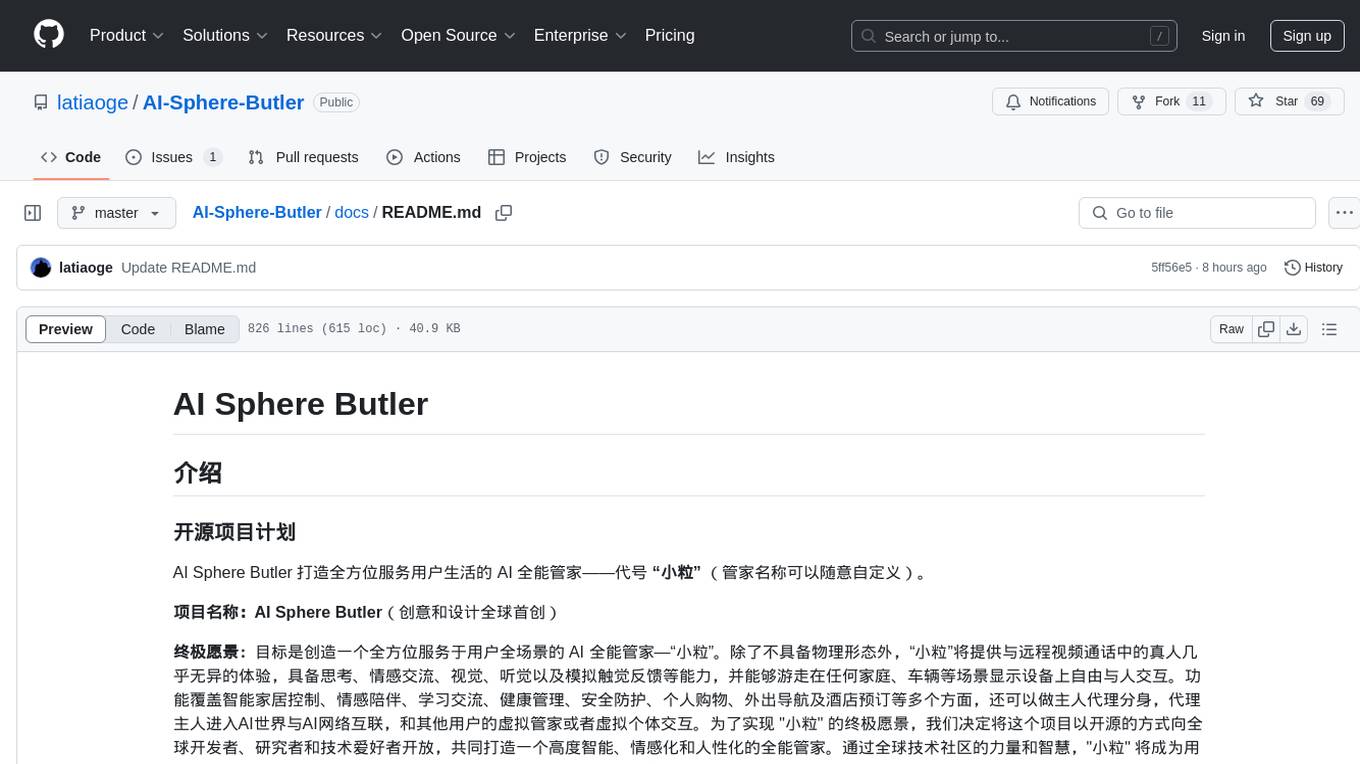
AI-CloudOps
AI+CloudOps智能化运维平台
Stars: 129
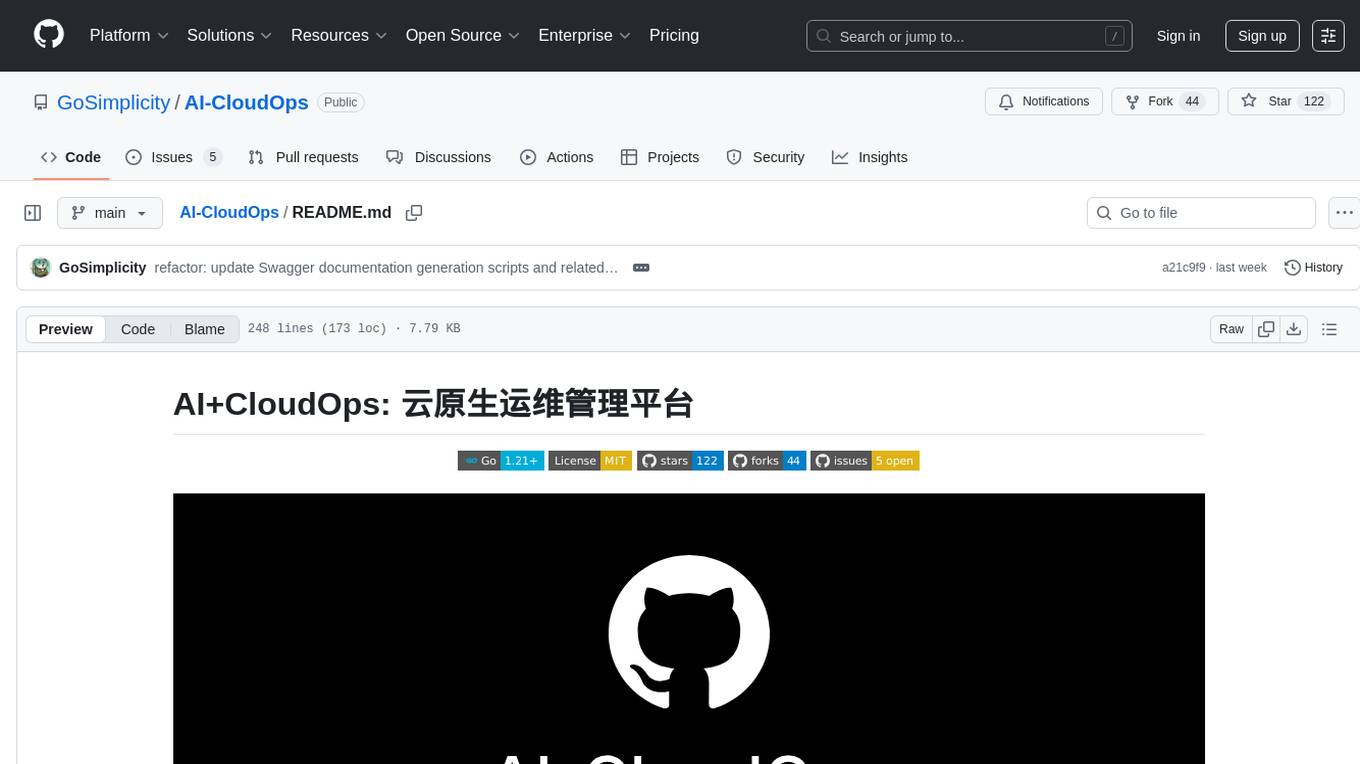
AI+CloudOps is a cloud-native operations management platform designed for enterprises. It aims to integrate artificial intelligence technology with cloud-native practices to significantly improve the efficiency and level of operations work. The platform offers features such as AIOps for monitoring data analysis and alerts, multi-dimensional permission management, visual CMDB for resource management, efficient ticketing system, deep integration with Prometheus for real-time monitoring, and unified Kubernetes management for cluster optimization.
README:
|
|
| 仓库 | 描述 | 技术栈 | 状态 |
|---|---|---|---|
| 🔧 AI-CloudOps | 核心后端服务 | Go + Gin + GORM |  |
| 🎨 AI-CloudOps-web | 前端用户界面 | Vue + TypeScript + Ant Design vue |  |
| 🧠 AI-CloudOps-aiops | AI 智能运维模块 | Python + FastAPI + scikit-learn |  |
┌─────────────────┐ ┌─────────────────┐ ┌─────────────────┐
│ 🎯 前端界面 │ ──▶ │ 🔧 核心后端 │ ──▶ │ 🧠 AI 分析 │
│ React + TS │ │ Go + Gin │ │ Python + ML │
└─────────────────┘ └─────────────────┘ └─────────────────┘
│ │ │
└───────────────────────┼───────────────────────┘
▼
┌─────────────────────────┐
│ ☁️ 云原生基础设施 │
│ K8s + Prometheus + 🗄️ │
└─────────────────────────┘
|
|
|
|
|
|

演示地址: http://68.64.177.180 登录凭据:
👤 用户名: |
🎨 仪表板: 查看系统整体运行状态 ☸️ K8s 管理: 体验 Kubernetes 集群管理 📊 监控面板: 感受实时监控能力 🤖 AI 分析: 尝试智能故障分析 📋 工单系统: 体验完整工单流程
|
🔧 GoSimplicity 项目发起人 & 核心贡献者 
|
⚡ Penge666 资深开发者 
|
🌟 shixiaocaia 资深贡献者 
|
💼 daihao4371 功能开发者 
|
🚴 骑自行车追狗 活跃贡献者 
|



|



|
# 检查所有依赖
go version # >= 1.23
node --version # >= 21.0
pnpm --version # latest
docker --version # latest
python3 --version # >= 3.11 |
📋 批量克隆脚本
#!/bin/bash
# 一键克隆所有项目
echo "🚀 开始克隆 AI-CloudOps 项目组..."
repositories=(
"https://github.com/GoSimplicity/AI-CloudOps.git"
"https://github.com/GoSimplicity/AI-CloudOps-web.git"
"https://github.com/GoSimplicity/AI-CloudOps-aiops.git"
)
for repo in "${repositories[@]}"; do
echo "📦 克隆 $repo"
git clone "$repo"
done
echo "✅ 所有项目克隆完成!"

|

|

|

|
# 进入后端项目目录
cd AI-CloudOps
# 🐳 使用 Docker Compose 启动中间件
docker-compose -f docker-compose-env.yaml up -d
# ⚙️ 配置环境变量
cp env.example .env
# 🔍 检查服务状态
docker-compose -f docker-compose-env.yaml ps |
🔧 启动的服务: |
# 进入前端项目目录
cd ../AI-CloudOps-web
# 📦 安装依赖
pnpm install
# 🚀 启动开发服务器
pnpm run dev |
🌐 访问地址:
|
# 回到后端项目目录
cd ../AI-CloudOps
# 📥 安装 Go 依赖
go mod tidy
# 🚀 启动后端主服务
go run main.go |
🔗 服务地址:
|
# 进入 AIOps 项目目录
cd ../AI-CloudOps-aiops
# ⚙️ 配置环境变量
cp env.example .env
# 📦 安装 Python 依赖
pip install -r requirements.txt
# 🤖 训练机器学习模型 (首次运行)
cd data/ && python machine-learning.py && cd ..
# 🚀 启动 AI 服务
python app/main.py |
🤖 AI 能力:
|

手动构建和部署 |

推荐方案 |

云原生生产级 |
📦 前端构建
# 进入前端项目目录
cd AI-CloudOps-web
# 📦 安装依赖
pnpm install
# 🔨 构建生产版本
pnpm run build
# 📊 查看构建结果
ls -la dist/🌐 Nginx 配置示例:
server {
listen 80;
server_name your-domain.com;
location / {
root /var/www/ai-cloudops/dist;
try_files $uri $uri/ /index.html;
}
location /api/ {
proxy_pass http://localhost:8000/api/;
proxy_set_header Host $host;
proxy_set_header X-Real-IP $remote_addr;
}
}🔧 后端构建
# 回到后端项目目录
cd AI-CloudOps
# 🔨 构建生产二进制
go build -o bin/ai-cloudops main.go
# ⚙️ 配置生产环境变量
cp config/config.production.yaml config.yaml
# 🚀 启动生产服务
./bin/ai-cloudops🔧 Systemd 服务配置:
[Unit]
Description=AI-CloudOps Backend Service
After=network.target
[Service]
Type=simple
User=cloudops
WorkingDirectory=/opt/ai-cloudops
ExecStart=/opt/ai-cloudops/bin/ai-cloudops
Restart=always
[Install]
WantedBy=multi-user.target# 📁 在 AI-CloudOps 项目根目录
cd AI-CloudOps
# 🚀 一键启动所有服务
docker-compose up -d
# 🔍 查看服务状态
docker-compose ps
# 📊 查看服务日志
docker-compose logs -f🔧 高级配置选项:
# 🔄 仅更新某个服务
docker-compose up -d backend
# 📊 监控资源使用
docker-compose top
# 🧹 清理和重启
docker-compose down && docker-compose up -d🚀 云原生生产级部署
# 📁 进入 Kubernetes 部署目录
cd deploy/kubernetes/
# ⚙️ 配置环境变量
cp config.example config
# 🚀 部署到 Kubernetes
kubectl apply -f .
# 🔍 查看部署状态
kubectl get pods,svc,ingress -l app=ai-cloudops📊 部署架构:
┌─────────────────┐ ┌─────────────────┐ ┌─────────────────┐
│ 📱 前端 Pod │───▶│ 🔧 后端 Pod │───▶│ 🧠 AI Pod │
│ React App │ │ Go Service │ │ Python ML │
│ (多副本) │ │ (多副本) │ │ (多副本) │
└─────────────────┘ └─────────────────┘ └─────────────────┘
│ │ │
└───────────────────────┼───────────────────────┘
▼
┌─────────────────────────┐
│ 🗄️ 数据层 Pod │
│ MySQL + Redis + 监控 │
└─────────────────────────┘
🔧 AI-CloudOps 后端架构
AI-CloudOps/
├── 📁 cmd/ # 命令行入口
│ └── webhook/ # Webhook 服务
├── 📁 config/ # 配置文件
│ ├── config.development.yaml
│ ├── config.production.yaml
│ └── webhook.yaml
├── 📁 deploy/ # 部署配置
│ ├── kubernetes/ # K8s 部署文件
│ ├── mysql/ # 数据库初始化
│ ├── nginx/ # 反向代理配置
│ └── prometheus/ # 监控配置
├── 📁 internal/ # 核心业务逻辑
│ ├── 🔐 middleware/ # 中间件 (认证、日志等)
│ ├── 📊 model/ # 数据模型
│ ├── 🏭 k8s/ # K8s 管理模块
│ ├── 👥 user/ # 用户管理
│ ├── 📈 prometheus/ # 监控指标
│ ├── 📋 workorder/ # 工单系统
│ ├── 🌲 tree/ # 服务树 CMDB
│ └── 🔧 system/ # 系统管理
├── 📁 pkg/ # 公共工具包
│ ├── di/ # 依赖注入
│ ├── utils/ # 工具函数
│ ├── ssh/ # SSH 连接
│ └── websocket/ # WebSocket 支持
├── 📁 docs/ # API 文档
│ ├── swagger.json
│ └── swagger.yaml
├── main.go # 程序入口
├── Dockerfile # 容器构建
├── docker-compose.yaml # 本地开发环境
└── go.mod # Go 模块管理
🏛️ 架构层级:
- 🌐 API Layer: RESTful API 接口层
- 🔄 Service Layer: 业务逻辑服务层
- 💾 Repository Layer: 数据访问层
- 🗄️ Infrastructure Layer: 基础设施层
⚡ AI-CloudOps-web 前端架构
AI-CloudOps-web/
├── 📁 apps/ # 应用程序目录
│ └── web-antd/ # 主应用 (Ant Design + Vue)
│ ├── src/
│ │ ├── 📁 api/ # API 接口层
│ │ ├── app.vue # 根组件
│ │ ├── bootstrap.ts # 应用启动配置
│ │ ├── 📁 composables/ # Vue Composables
│ │ ├── 📁 layouts/ # 布局组件
│ │ ├── 📁 locales/ # 国际化文件
│ │ ├── main.ts # 应用入口
│ │ ├── preferences.ts # 用户偏好设置
│ │ ├── 📁 router/ # 路由配置
│ │ ├── 📁 store/ # 状态管理
│ │ ├── 📁 types/ # TypeScript 类型
│ │ └── 📁 views/ # 页面视图组件
│ ├── dist/ # 构建输出
│ ├── public/ # 静态资源
│ ├── index.html # 入口 HTML
│ ├── package.json # 项目依赖
│ ├── tailwind.config.mjs # Tailwind 配置
│ ├── tsconfig.json # TypeScript 配置
│ └── vite.config.mts # Vite 构建配置
├── 📁 packages/ # 共享包 (Monorepo)
├── 📁 internal/ # 内部工具包
├── 📁 docs/ # 文档目录
├── 📁 scripts/ # 构建脚本
├── cspell.json # 拼写检查配置
├── eslint.config.mjs # ESLint 配置
├── stylelint.config.mjs # 样式检查配置
├── vitest.config.ts # 单元测试配置
├── vitest.workspace.ts # 测试工作空间
├── turbo.json # Turborepo 配置
├── pnpm-workspace.yaml # PNPM 工作空间
├── pnpm-lock.yaml # 锁定文件
├── package.json # 根项目依赖
└── README.md # 项目说明
🎯 技术特性:
- ⚡ Vite: 极速构建工具
- 🎨 Ant Design: 企业级 UI 组件
- 📱 响应式: 适配多端设备
- 🔄 状态管理: Zustand/Redux
- 📊 可视化: ECharts/D3.js
- 🧪 测试: Vitest + Testing Library
🤖 AI-CloudOps-aiops 智能模块
AI-CloudOps-aiops/
├── 📁 app/ # 应用主代码
│ ├── __init__.py # 包初始化文件
│ ├── main.py # FastAPI 入口
│ ├── 📁 api/ # API 路由层
│ ├── 📁 common/ # 通用模块
│ ├── 📁 config/ # 应用配置
│ ├── 📁 core/ # 核心业务逻辑
│ ├── 📁 mcp/ # MCP 协议实现
│ ├── 📁 models/ # 数据模型定义
│ ├── 📁 services/ # 业务服务层
│ └── 📁 utils/ # 工具函数
├── 📁 config/ # 全局配置文件
├── 📁 data/ # 数据存储
├── 📁 deploy/ # 部署配置
├── 📁 docs/ # 文档目录
├── 📁 logs/ # 日志文件
├── 📁 scripts/ # 脚本工具
├── 📁 tests/ # 测试用例
├── 📁 tools/ # 开发工具
├── Dockerfile # 容器构建文件
├── Dockerfile.mcp # MCP 服务容器
├── docker-compose.yml # 本地开发环境
├── env.example # 环境变量模板
├── LICENSE # 开源许可证
├── pyproject.toml # Python 项目配置
├── pytest.ini # 测试配置
├── README.md # 项目说明
└── requirements.txt # Python 依赖
🧠 AI 能力:
- 📊 时间序列分析: LSTM, ARIMA, Prophet
- 🔍 异常检测: Isolation Forest, LOF
- 🎯 分类预测: Random Forest, XGBoost
- 📈 回归分析: Linear, Polynomial, SVR
- 🕸️ 知识图谱: Neo4j, NetworkX
- 📝 NLP 处理: BERT, Word2Vec
# 1. Fork 仓库
gh repo fork GoSimplicity/AI-CloudOps
# 2. 克隆到本地
git clone https://github.com/YOUR_USERNAME/AI-CloudOps.git
# 3. 创建特性分支
git checkout -b feature/amazing-feature
# 4. 提交更改
git commit -m "✨ Add amazing feature"
# 5. 推送分支
git push origin feature/amazing-feature
# 6. 创建 Pull Request
gh pr create --title "Add amazing feature" --body "Description of the feature"- 🐛 Bug 修复: 发现并修复代码问题
- ✨ 新功能: 添加令人兴奋的新特性
- 📚 文档: 改善项目文档和说明
- 🎨 UI/UX: 提升用户界面和体验
- ⚡ 性能: 优化系统性能和效率
- 🧪 测试: 增加测试覆盖率
- 🔧 工具: 改进开发工具和流程
- 🌐 国际化: 支持多语言和本地化
💻 代码规范
// ✅ 推荐的代码风格
func (s *UserService) CreateUser(ctx context.Context, req *CreateUserRequest) (*User, error) {
// 参数验证
if err := req.Validate(); err != nil {
return nil, fmt.Errorf("invalid request: %w", err)
}
// 业务逻辑
user := &User{
Name: req.Name,
Email: req.Email,
}
return s.repo.Create(ctx, user)
}// ✅ 推荐的代码风格
interface UserCreateRequest {
name: string;
email: string;
}
const createUser = async (request: UserCreateRequest): Promise<User> => {
const response = await api.post('/users', request);
return response.data;
};📝 提交信息规范
使用 Conventional Commits 规范:
<type>(<scope>): <description>
[optional body]
[optional footer]
提交类型:
-
feat: 新功能 -
fix: Bug 修复 -
docs: 文档更新 -
style: 代码格式调整 -
refactor: 重构代码 -
perf: 性能优化 -
test: 测试相关 -
ci: CI/CD 配置
示例:
git commit -m "feat(k8s): add pod auto-scaling feature"
git commit -m "fix(auth): resolve login timeout issue"
git commit -m "docs(readme): update installation guide"感谢所有为 AI-CloudOps 做出贡献的开发者和用户!
正是因为你们的支持和贡献,这个项目才能不断进步和完善。
|
Go 生态系统 Vue 生态系统 Kubernetes 社区 开源社区 |
Grafana Prometheus Istio ArgoCD |
GitHub Actions Docker Hub DigitalOcean Cloudflare |
Ant Design Vue Heroicons Unsplash Figma |



共同构建更智能的云原生运维未来!
🎉 感谢您阅读到这里!如果觉得项目有用,请给我们一个 Star ⭐
For Tasks:
Click tags to check more tools for each tasksFor Jobs:
Alternative AI tools for AI-CloudOps
Similar Open Source Tools

AI-CloudOps
AI+CloudOps is a cloud-native operations management platform designed for enterprises. It aims to integrate artificial intelligence technology with cloud-native practices to significantly improve the efficiency and level of operations work. The platform offers features such as AIOps for monitoring data analysis and alerts, multi-dimensional permission management, visual CMDB for resource management, efficient ticketing system, deep integration with Prometheus for real-time monitoring, and unified Kubernetes management for cluster optimization.
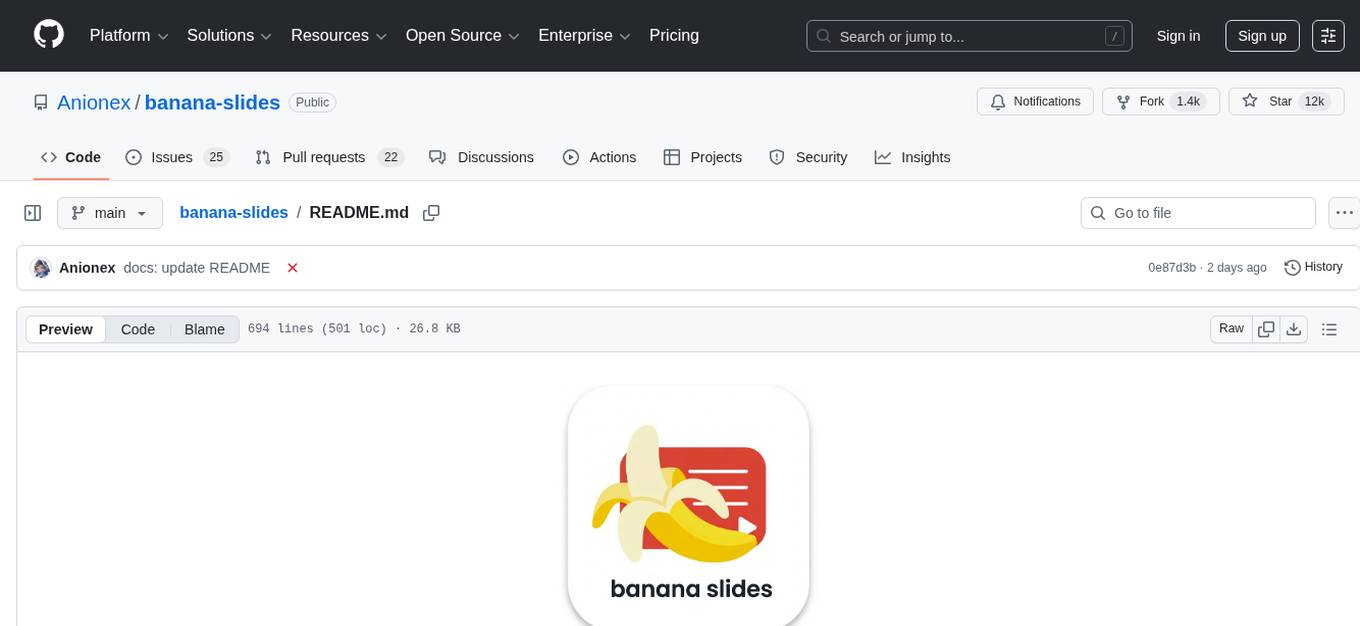
banana-slides
Banana-slides is a native AI-powered PPT generation application based on the nano banana pro model. It supports generating complete PPT presentations from ideas, outlines, and page descriptions. The app automatically extracts attachment charts, uploads any materials, and allows verbal modifications, aiming to truly 'Vibe PPT'. It lowers the threshold for creating PPTs, enabling everyone to quickly create visually appealing and professional presentations.
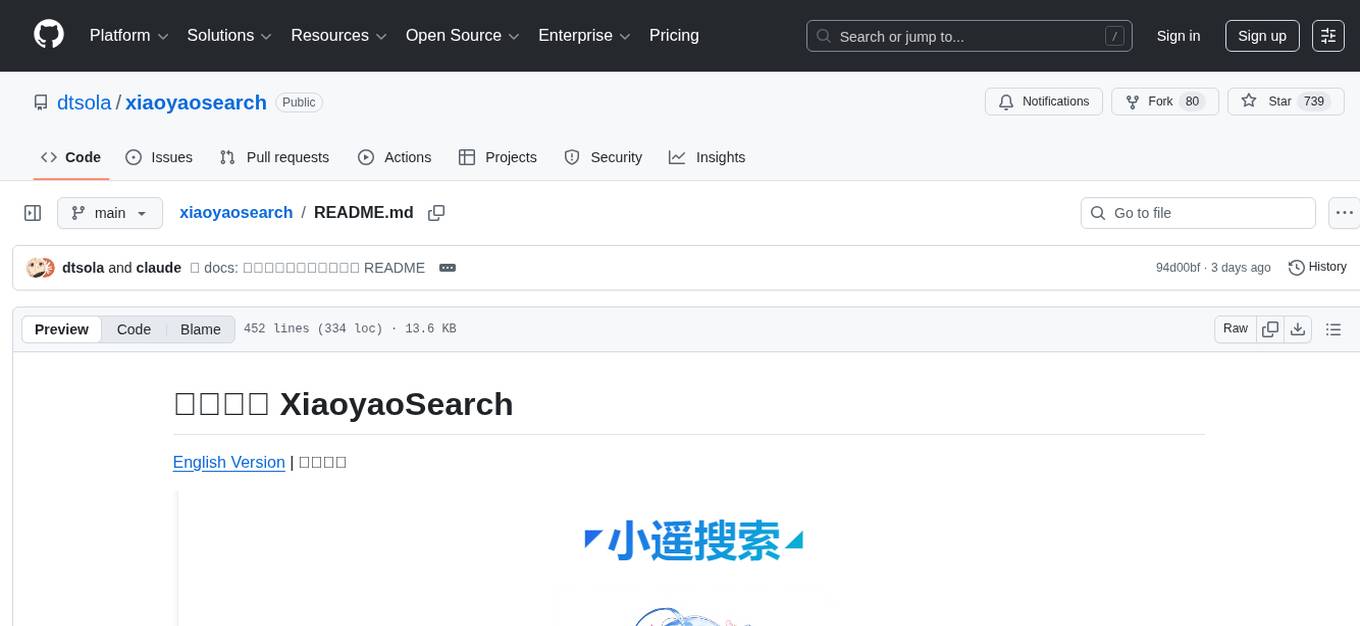
xiaoyaosearch
XiaoyaoSearch is a cross-platform local desktop application designed for knowledge workers, content creators, and developers. It integrates AI models to support various input methods such as voice, text, and image to intelligently search local files. The application is free for non-commercial use, provides source code and development documentation, and ensures privacy by running locally without uploading data to the cloud. It features modern interface design using Electron, Vue 3, and TypeScript.
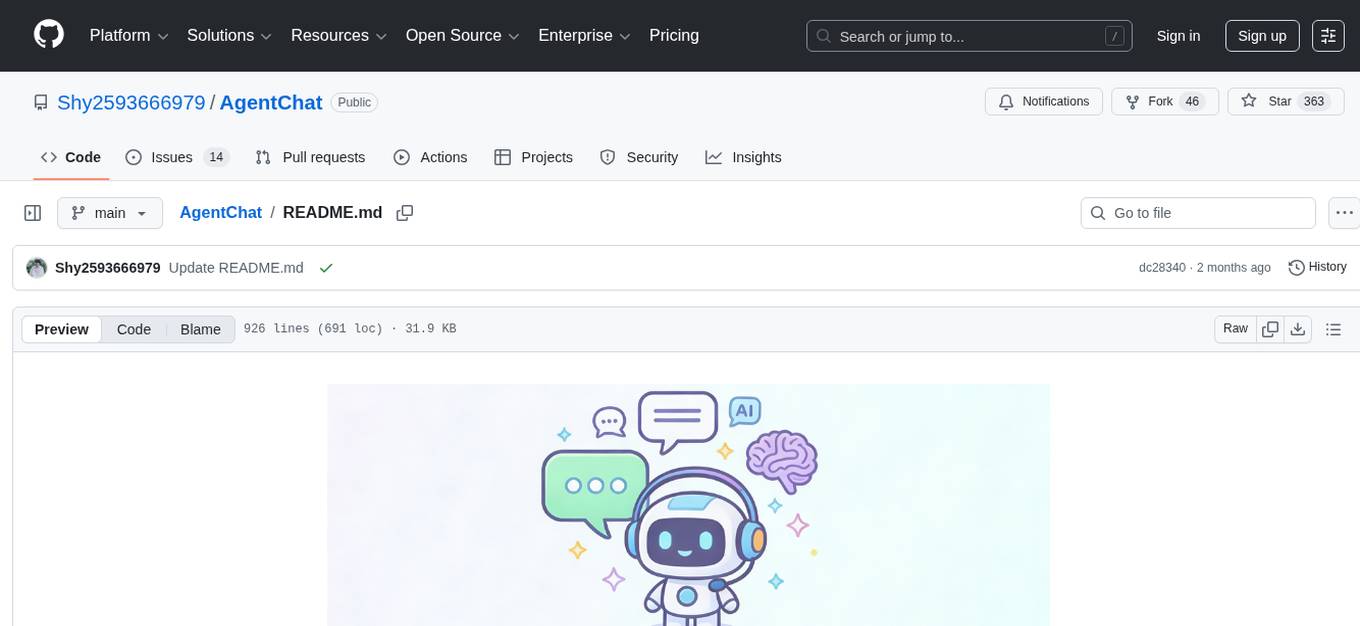
AgentChat
AgentChat is a modern intelligent conversation system built on large language models, providing rich AI conversation features. The system adopts a front-end and back-end separation architecture, supporting various AI models, knowledge base retrieval, tool invocation, MCP server integration, and other advanced functions. It features multiple model support, intelligent agents supporting collaboration, precise knowledge retrieval with RAG technology, a tool ecosystem with customizable extensions, MCP integration supporting Model Context Protocol servers, real-time conversation with smooth user experience, and a modern interface based on Vue 3 and Element Plus.
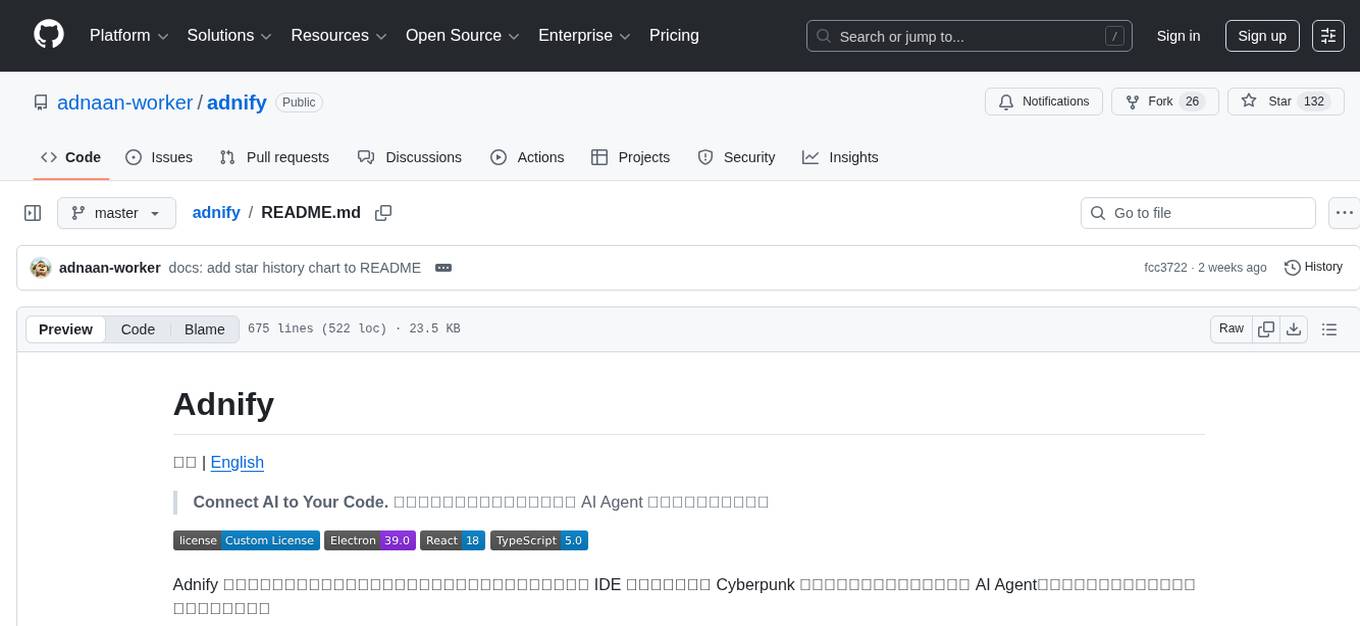
adnify
Adnify is an advanced code editor with ultimate visual experience and deep integration of AI Agent. It goes beyond traditional IDEs, featuring Cyberpunk glass morphism design style and a powerful AI Agent supporting full automation from code generation to file operations.
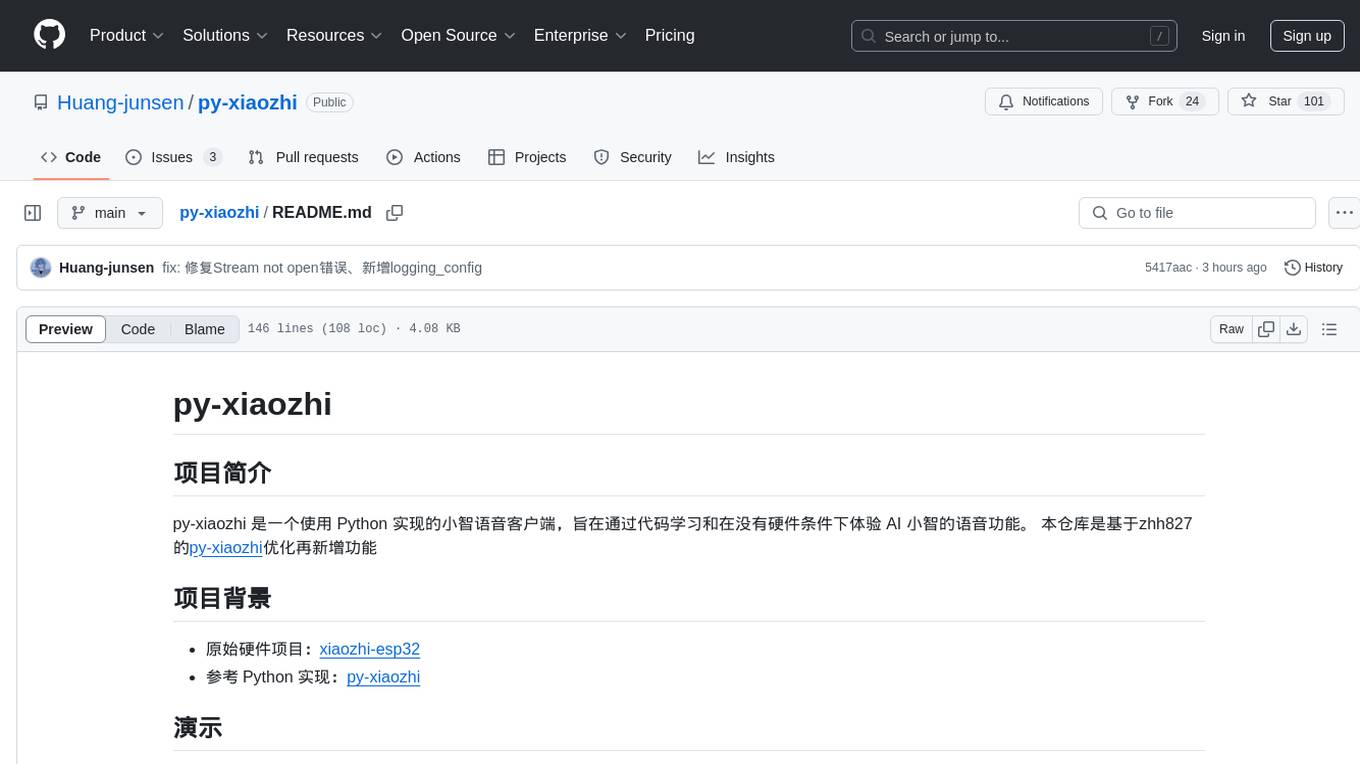
py-xiaozhi
py-xiaozhi is a Python-based XiaoZhi voice client designed for learning code and experiencing AI XiaoZhi's voice functions without hardware conditions. It features voice interaction, graphical interface, volume control, session management, encrypted audio transmission, CLI mode, and automatic copying of verification codes and opening browsers for first-time users. The project aims to optimize and add new features to zhh827's py-xiaozhi based on the original hardware project xiaozhi-esp32 and the Python implementation py-xiaozhi.

resume-design
Resume-design is an open-source and free resume design and template download website, built with Vue3 + TypeScript + Vite + Element-plus + pinia. It provides two design tools for creating beautiful resumes and a complete backend management system. The project has released two frontend versions and will integrate with a backend system in the future. Users can learn frontend by downloading the released versions or learn design tools by pulling the latest frontend code.
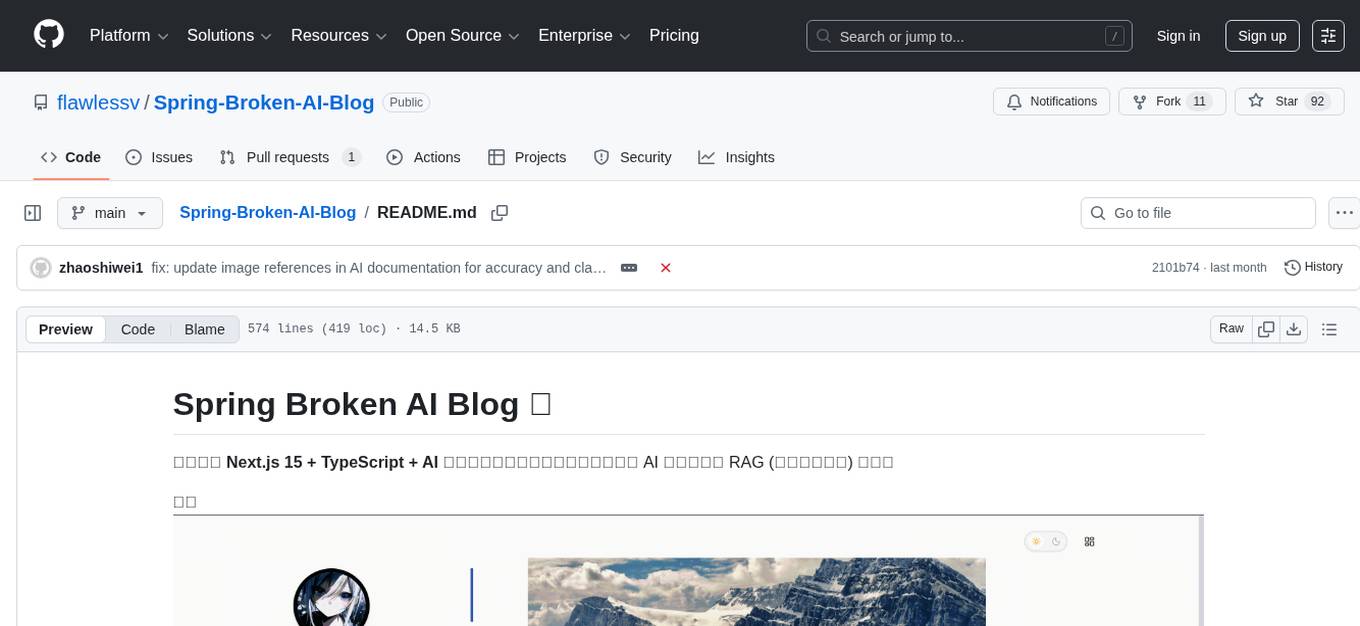
Spring-Broken-AI-Blog
Spring Broken AI Blog is a modern intelligent blog system built on Next.js 15 + TypeScript + AI, integrating AI assistant and RAG (retrieval-augmented generation) functions. It features modern frontend using Next.js with App Router and Turbopack, full-stack TypeScript support, headless components with shadcn/ui + Radix UI + Tailwind CSS, NextAuth.js v4 + JWT authentication strategy, Prisma ORM with SQLite/PostgreSQL, ESLint + Prettier + Husky for code quality, and responsive design. The AI highlights include AI writing assistant based on Kimi API, vector index system using ChromaDB + Ollama for local vector storage, RAG chat function for intelligent Q&A based on article content, AI completion feature for smart content continuation in the editor, AI recommendations for automatic category and tag suggestions, and real-time display of AI-generated content.
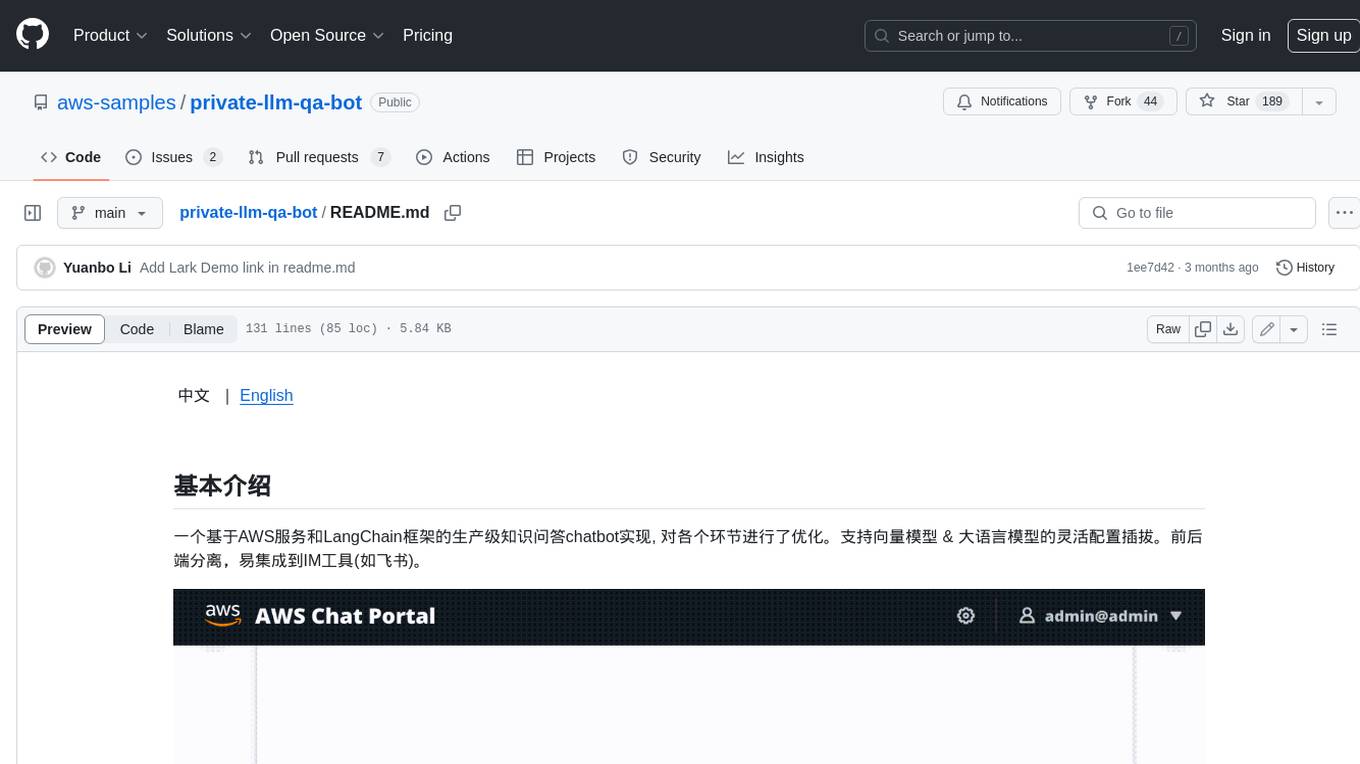
private-llm-qa-bot
This is a production-grade knowledge Q&A chatbot implementation based on AWS services and the LangChain framework, with optimizations at various stages. It supports flexible configuration and plugging of vector models and large language models. The front and back ends are separated, making it easy to integrate with IM tools (such as Feishu).
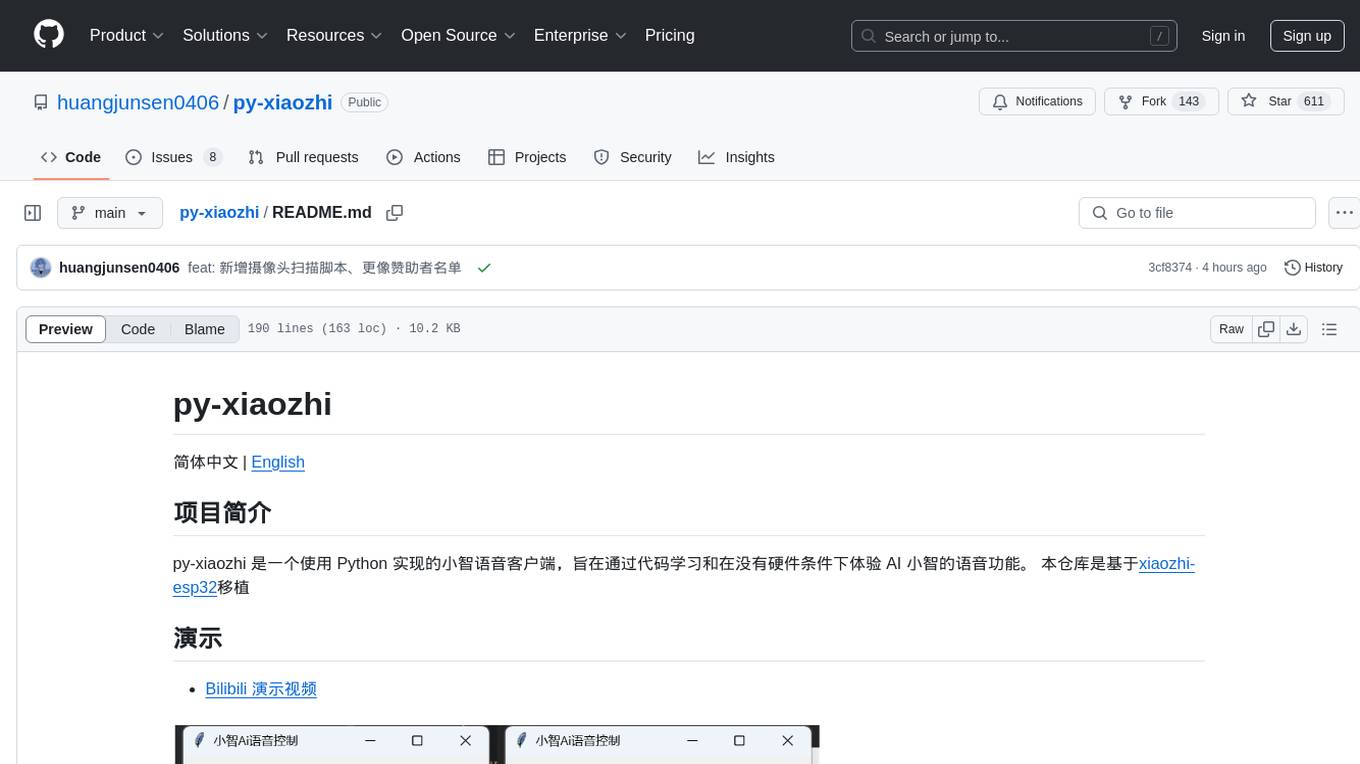
py-xiaozhi
py-xiaozhi is a Python-based XiaoZhi voice client designed for learning through code and experiencing AI XiaoZhi's voice functions without hardware conditions. The repository is based on the xiaozhi-esp32 port. It supports AI voice interaction, visual multimodal capabilities, IoT device integration, online music playback, voice wake-up, automatic conversation mode, graphical user interface, command-line mode, cross-platform support, volume control, session management, encrypted audio transmission, automatic captcha handling, automatic MAC address retrieval, code modularization, and stability optimization.
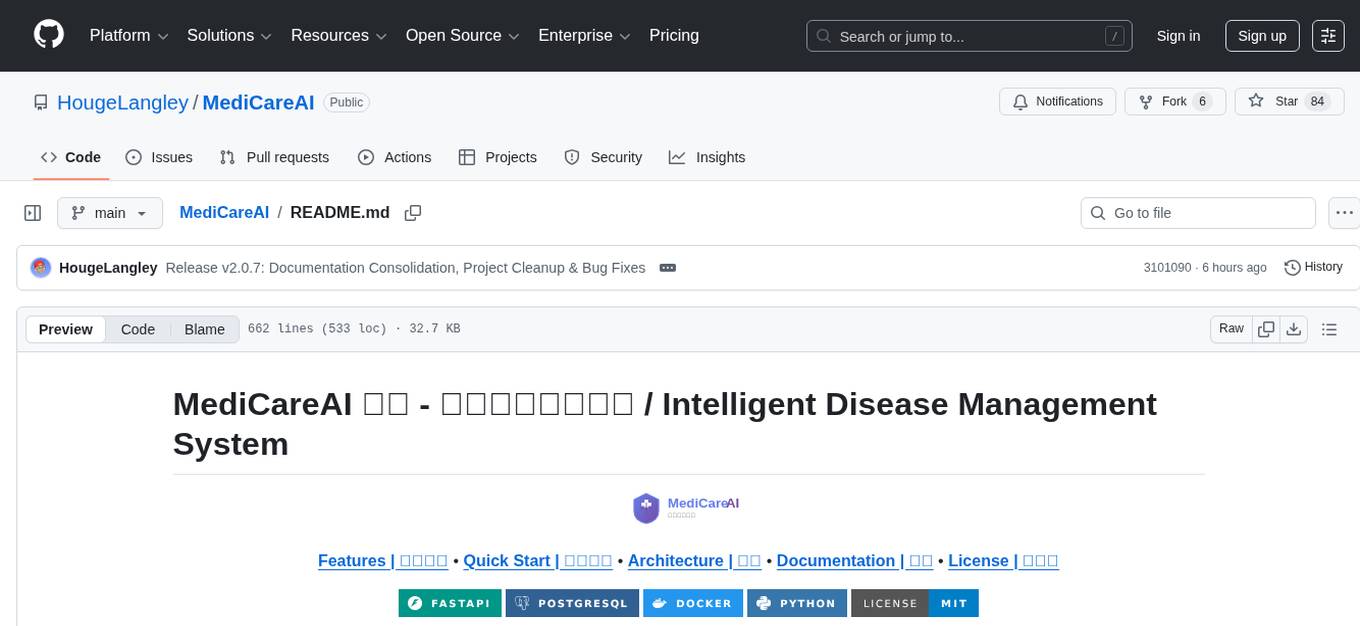
MediCareAI
MediCareAI is an intelligent disease management system powered by AI, designed for patient follow-up and disease tracking. It integrates medical guidelines, AI-powered diagnosis, and document processing to provide comprehensive healthcare support. The system includes features like user authentication, patient management, AI diagnosis, document processing, medical records management, knowledge base system, doctor collaboration platform, and admin system. It ensures privacy protection through automatic PII detection and cleaning for document sharing.
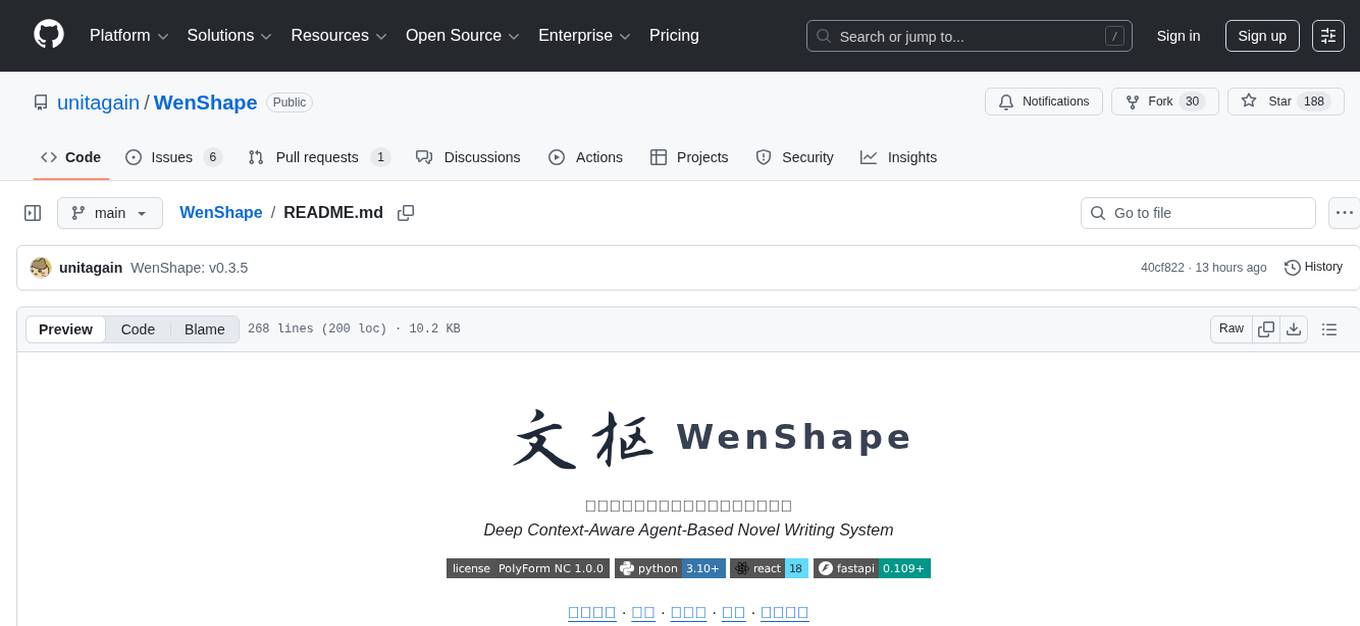
WenShape
WenShape is a context engineering system for creating long novels. It addresses the challenge of narrative consistency over thousands of words by using an orchestrated writing process, dynamic fact tracking, and precise token budget management. All project data is stored in YAML/Markdown/JSONL text format, naturally supporting Git version control.
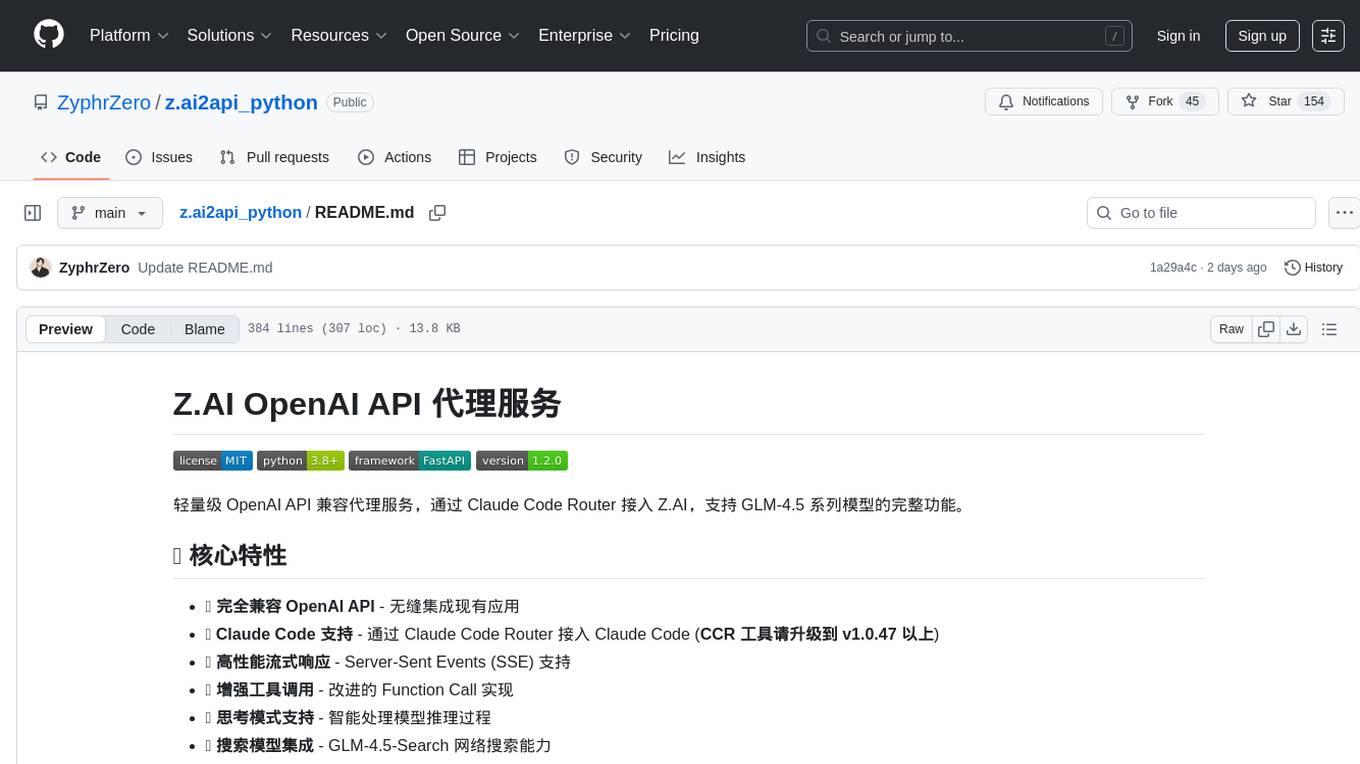
z.ai2api_python
Z.AI2API Python is a lightweight OpenAI API proxy service that integrates seamlessly with existing applications. It supports the full functionality of GLM-4.5 series models and features high-performance streaming responses, enhanced tool invocation, support for thinking mode, integration with search models, Docker deployment, session isolation for privacy protection, flexible configuration via environment variables, and intelligent upstream model routing.
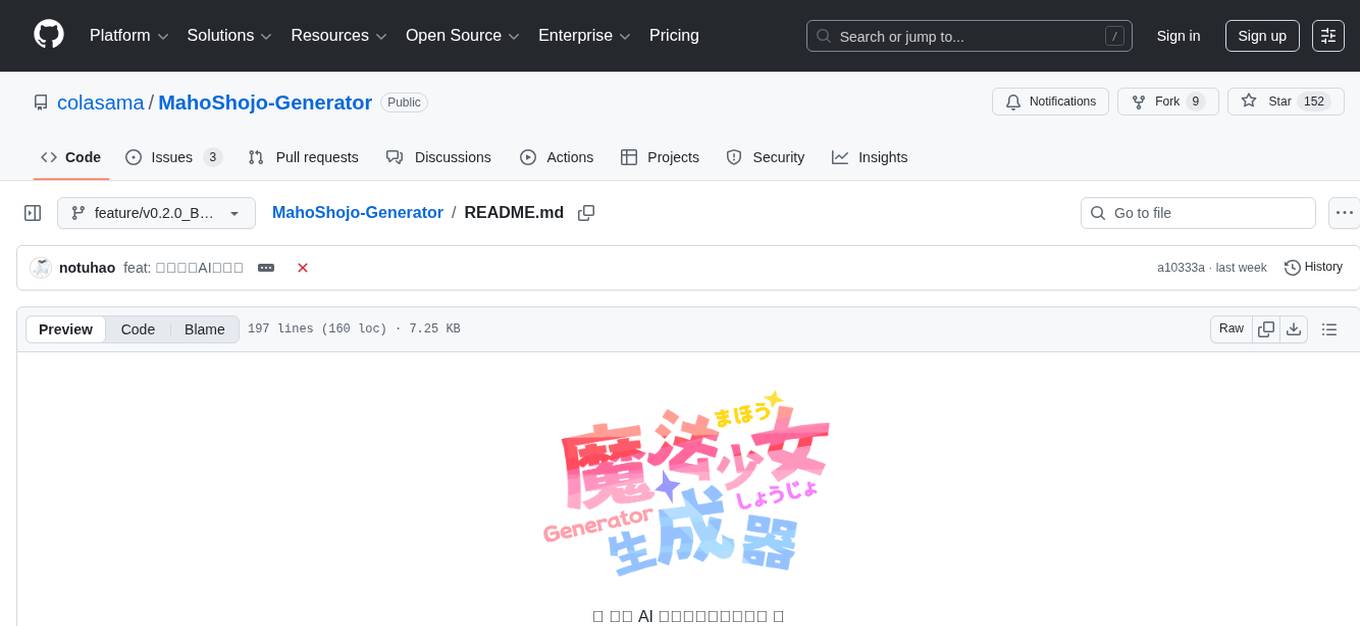
MahoShojo-Generator
MahoShojo-Generator is a web-based AI structured generation tool that allows players to create personalized and evolving magical girls (or quirky characters) and related roles. It offers exciting cyber battles, storytelling activities, and even a ranking feature. The project also includes AI multi-channel polling, user system, public data card sharing, and sensitive word detection. It supports various functionalities such as character generation, arena system, growth and social interaction, cloud and sharing, and other features like scenario generation, tavern ecosystem linkage, and content safety measures.
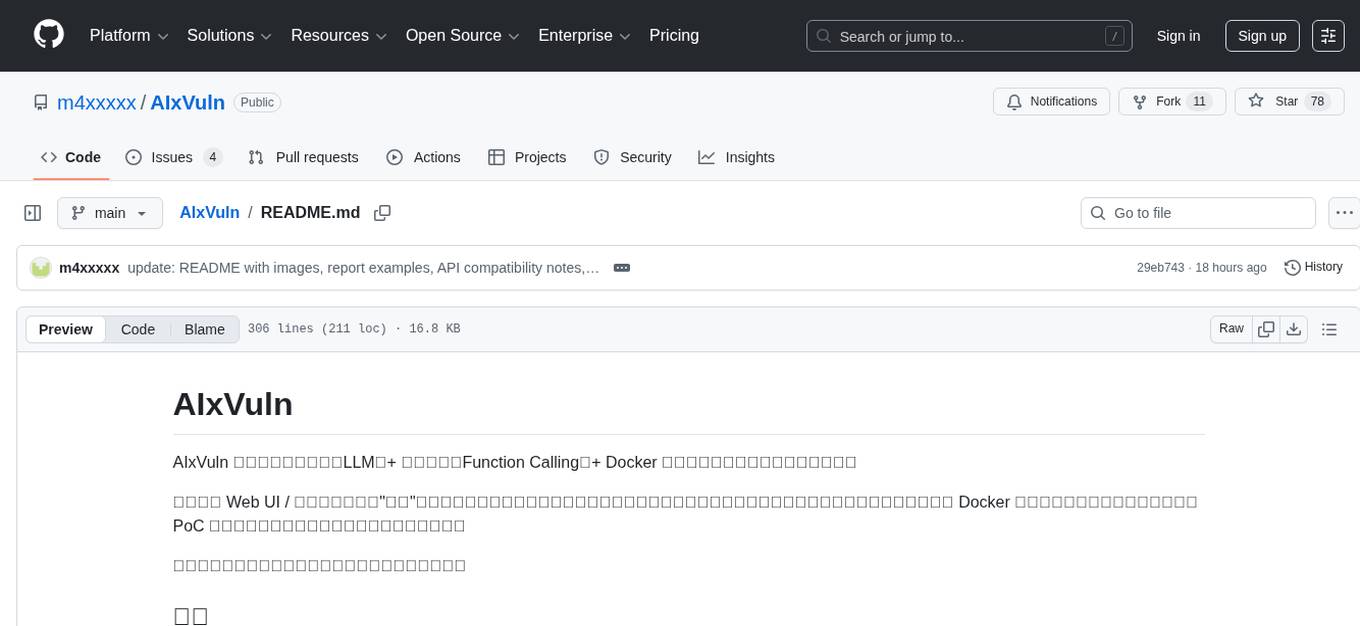
AIxVuln
AIxVuln is an automated vulnerability discovery and verification system based on large models (LLM) + function calling + Docker sandbox. The system manages 'projects' through a web UI/desktop client, automatically organizing multiple 'digital humans' for environment setup, code auditing, vulnerability verification, and report generation. It utilizes an isolated Docker environment for dependency installation, service startup, PoC verification, and evidence collection, ultimately producing downloadable vulnerability reports. The system has already discovered dozens of vulnerabilities in real open-source projects.
For similar tasks

AI-CloudOps
AI+CloudOps is a cloud-native operations management platform designed for enterprises. It aims to integrate artificial intelligence technology with cloud-native practices to significantly improve the efficiency and level of operations work. The platform offers features such as AIOps for monitoring data analysis and alerts, multi-dimensional permission management, visual CMDB for resource management, efficient ticketing system, deep integration with Prometheus for real-time monitoring, and unified Kubernetes management for cluster optimization.
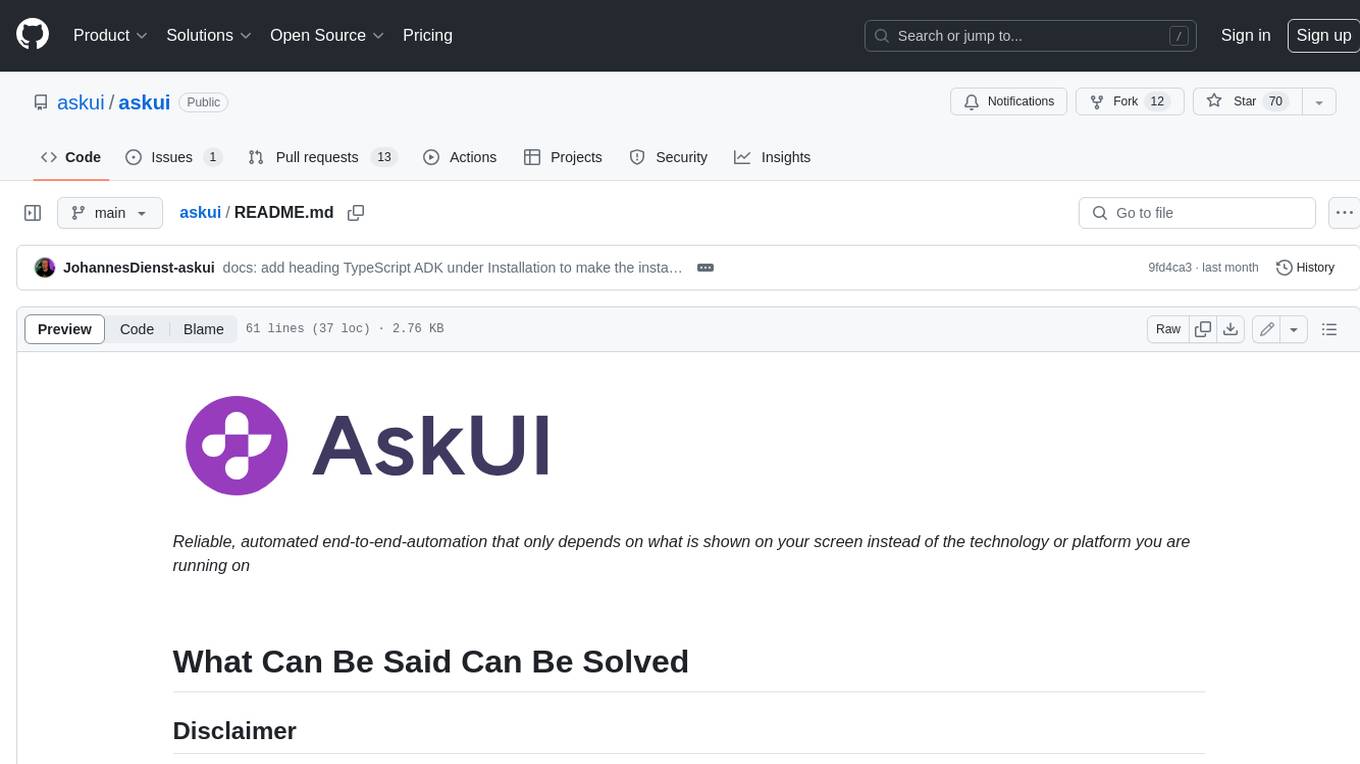
askui
AskUI is a reliable, automated end-to-end automation tool that only depends on what is shown on your screen instead of the technology or platform you are running on.
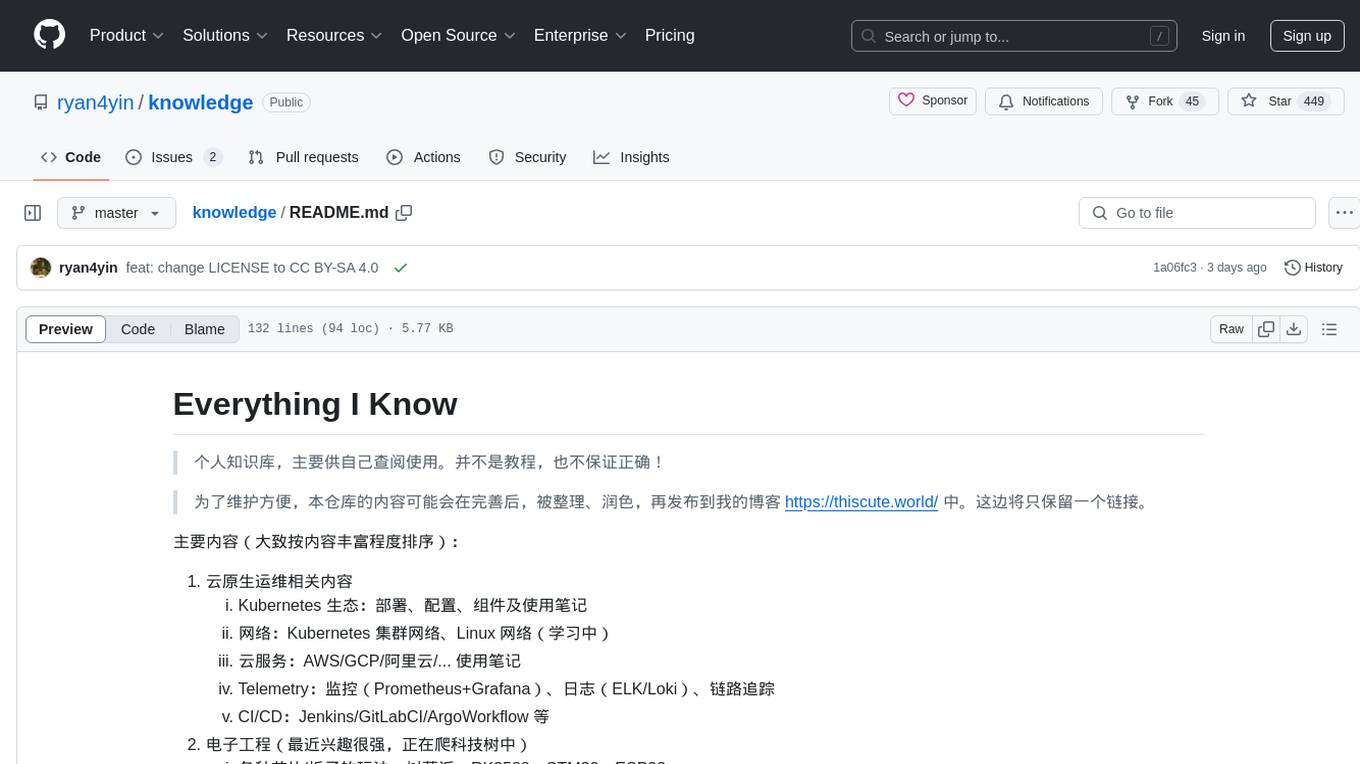
knowledge
This repository serves as a personal knowledge base for the owner's reference and use. It covers a wide range of topics including cloud-native operations, Kubernetes ecosystem, networking, cloud services, telemetry, CI/CD, electronic engineering, hardware projects, operating systems, homelab setups, high-performance computing applications, openwrt router usage, programming languages, music theory, blockchain, distributed systems principles, and various other knowledge domains. The content is periodically refined and published on the owner's blog for maintenance purposes.
For similar jobs
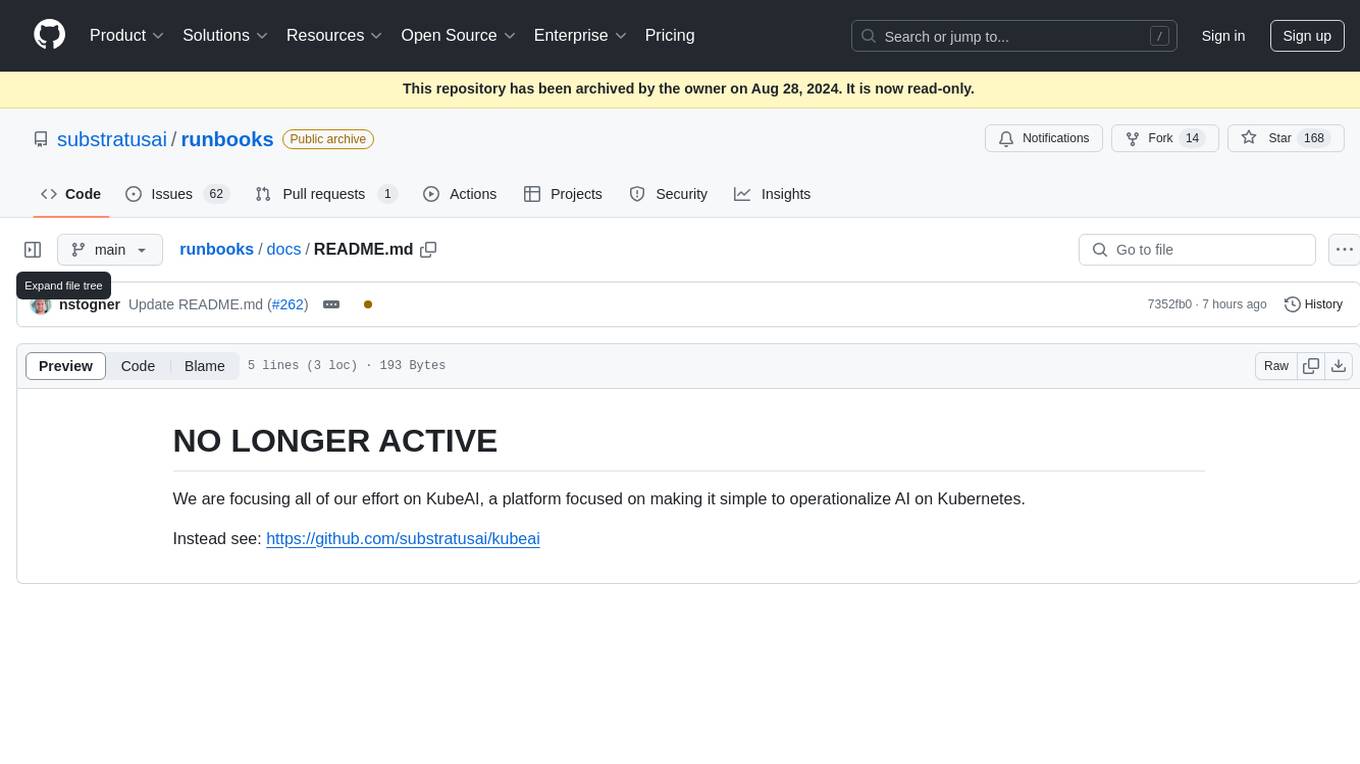
runbooks
Runbooks is a repository that is no longer active. The project has been deprecated in favor of KubeAI, a platform designed to simplify the operationalization of AI on Kubernetes. For more information, please refer to the new repository at https://github.com/substratusai/kubeai.
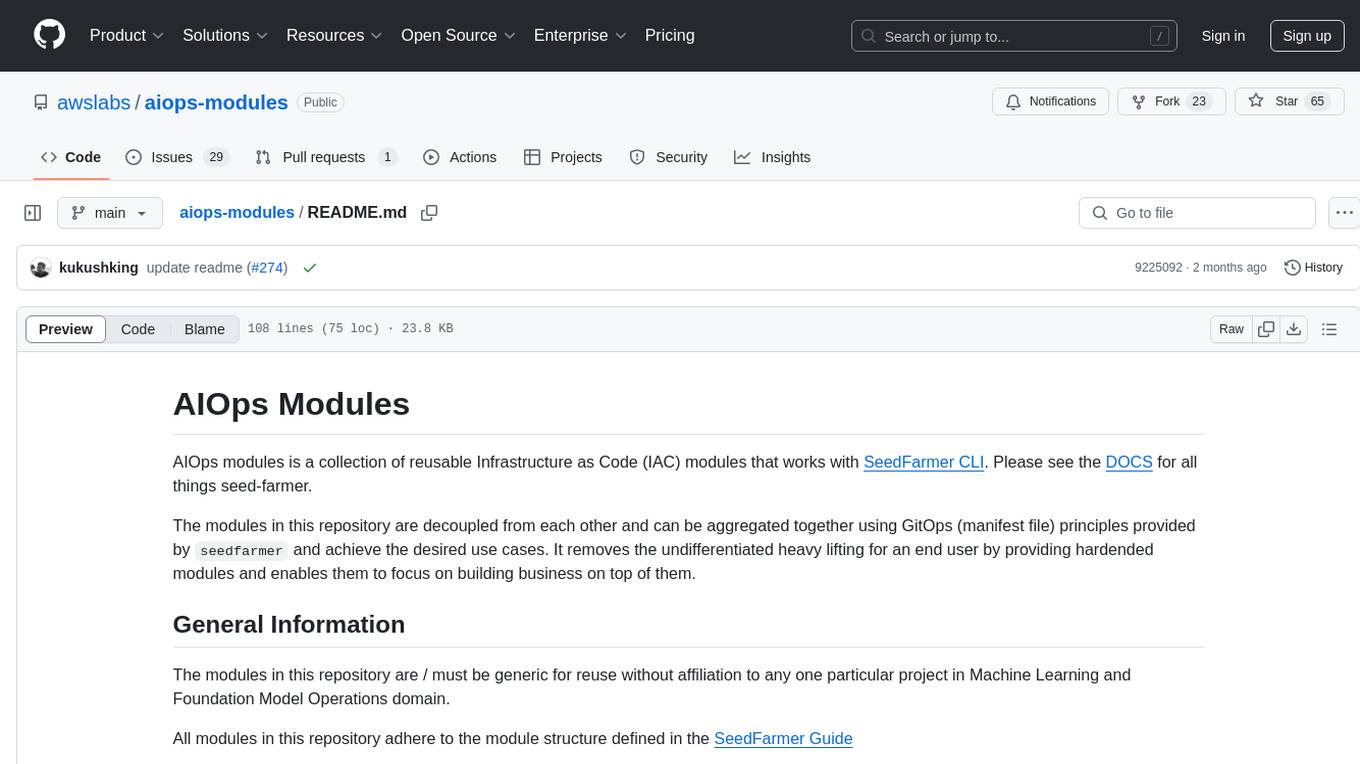
aiops-modules
AIOps Modules is a collection of reusable Infrastructure as Code (IAC) modules that work with SeedFarmer CLI. The modules are decoupled and can be aggregated using GitOps principles to achieve desired use cases, removing heavy lifting for end users. They must be generic for reuse in Machine Learning and Foundation Model Operations domain, adhering to SeedFarmer Guide structure. The repository includes deployment steps, project manifests, and various modules for SageMaker, Mlflow, FMOps/LLMOps, MWAA, Step Functions, EKS, and example use cases. It also supports Industry Data Framework (IDF) and Autonomous Driving Data Framework (ADDF) Modules.
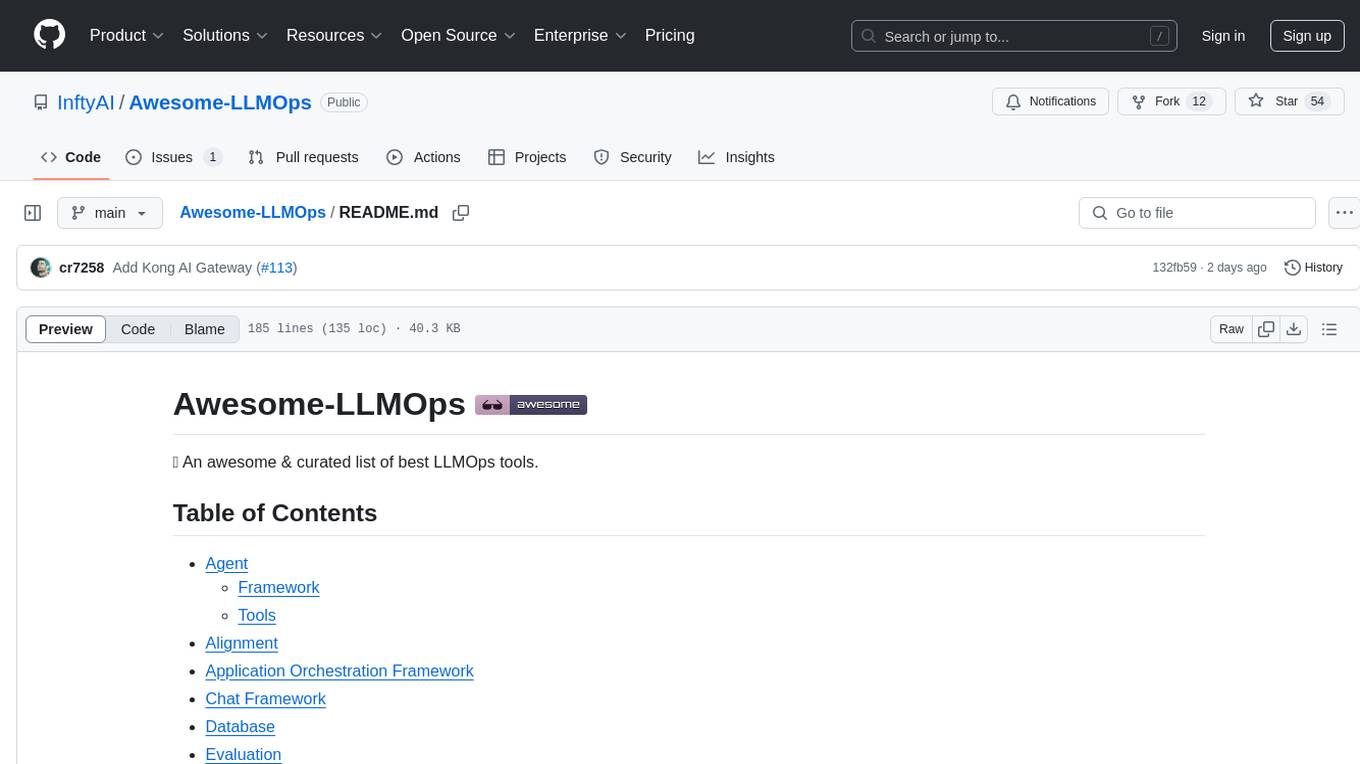
Awesome-LLMOps
Awesome-LLMOps is a curated list of the best LLMOps tools, providing a comprehensive collection of frameworks and tools for building, deploying, and managing large language models (LLMs) and AI agents. The repository includes a wide range of tools for tasks such as building multimodal AI agents, fine-tuning models, orchestrating applications, evaluating models, and serving models for inference. It covers various aspects of the machine learning operations (MLOps) lifecycle, from training to deployment and observability. The tools listed in this repository cater to the needs of developers, data scientists, and machine learning engineers working with large language models and AI applications.
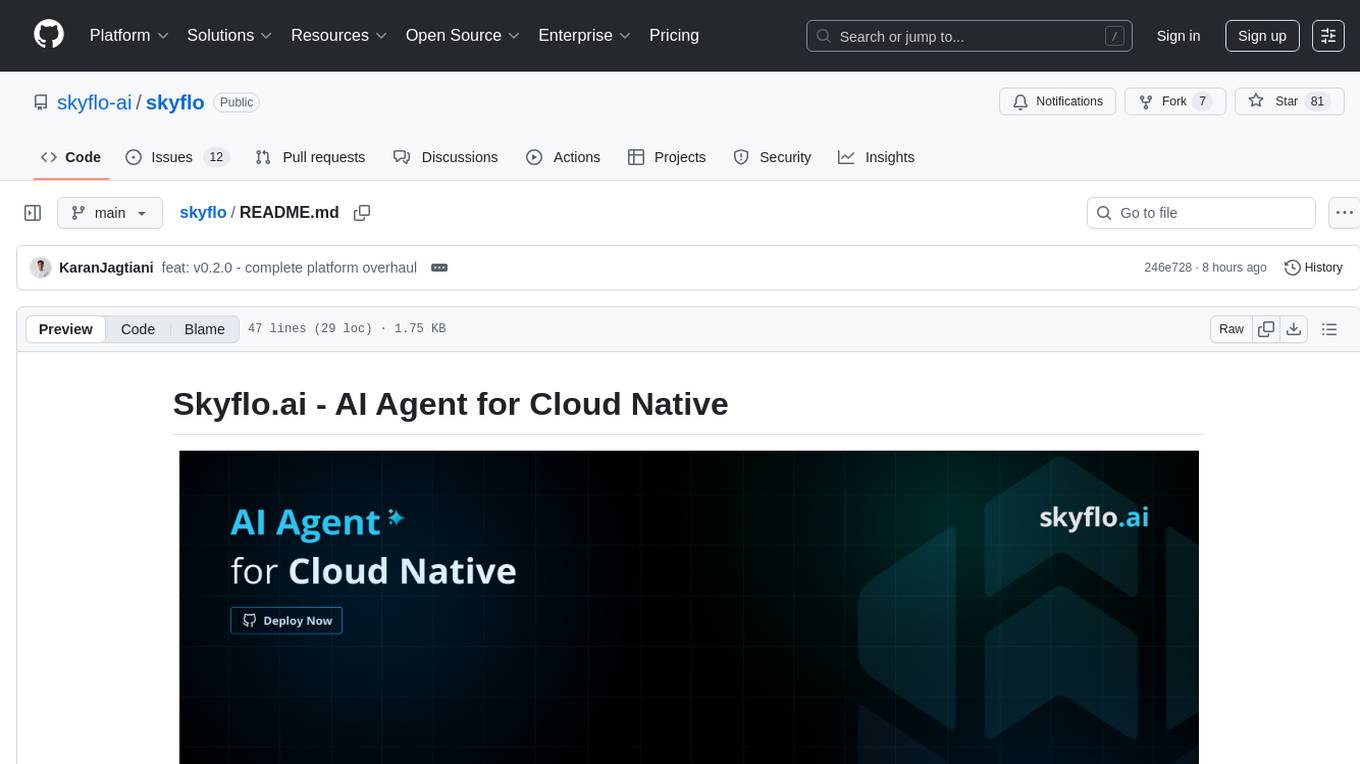
skyflo
Skyflo.ai is an AI agent designed for Cloud Native operations, providing seamless infrastructure management through natural language interactions. It serves as a safety-first co-pilot with a human-in-the-loop design. The tool offers flexible deployment options for both production and local Kubernetes environments, supporting various LLM providers and self-hosted models. Users can explore the architecture of Skyflo.ai and contribute to its development following the provided guidelines and Code of Conduct. The community engagement includes Discord, Twitter, YouTube, and GitHub Discussions.

AI-CloudOps
AI+CloudOps is a cloud-native operations management platform designed for enterprises. It aims to integrate artificial intelligence technology with cloud-native practices to significantly improve the efficiency and level of operations work. The platform offers features such as AIOps for monitoring data analysis and alerts, multi-dimensional permission management, visual CMDB for resource management, efficient ticketing system, deep integration with Prometheus for real-time monitoring, and unified Kubernetes management for cluster optimization.
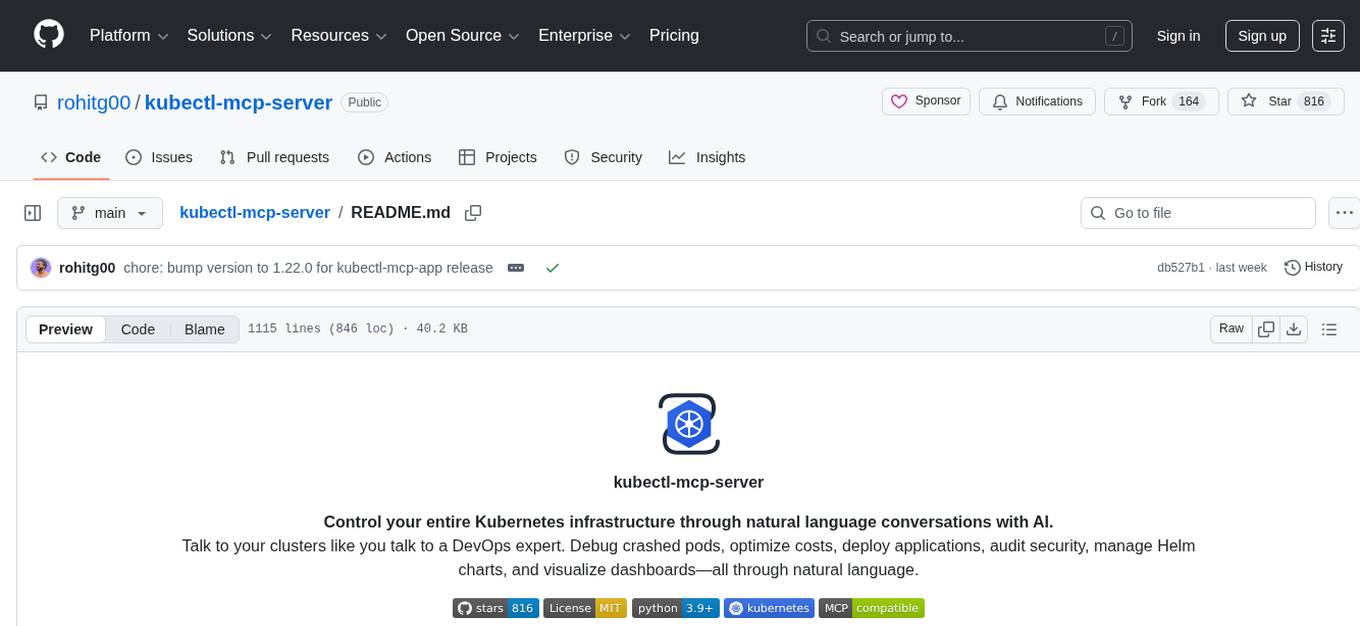
kubectl-mcp-server
Control your entire Kubernetes infrastructure through natural language conversations with AI. Talk to your clusters like you talk to a DevOps expert. Debug crashed pods, optimize costs, deploy applications, audit security, manage Helm charts, and visualize dashboards—all through natural language. The tool provides 253 powerful tools, 8 workflow prompts, 8 data resources, and works with all major AI assistants. It offers AI-powered diagnostics, built-in cost optimization, enterprise-ready features, zero learning curve, universal compatibility, visual insights, and production-grade deployment options. From debugging crashed pods to optimizing cluster costs, kubectl-mcp-server is your AI-powered DevOps companion.
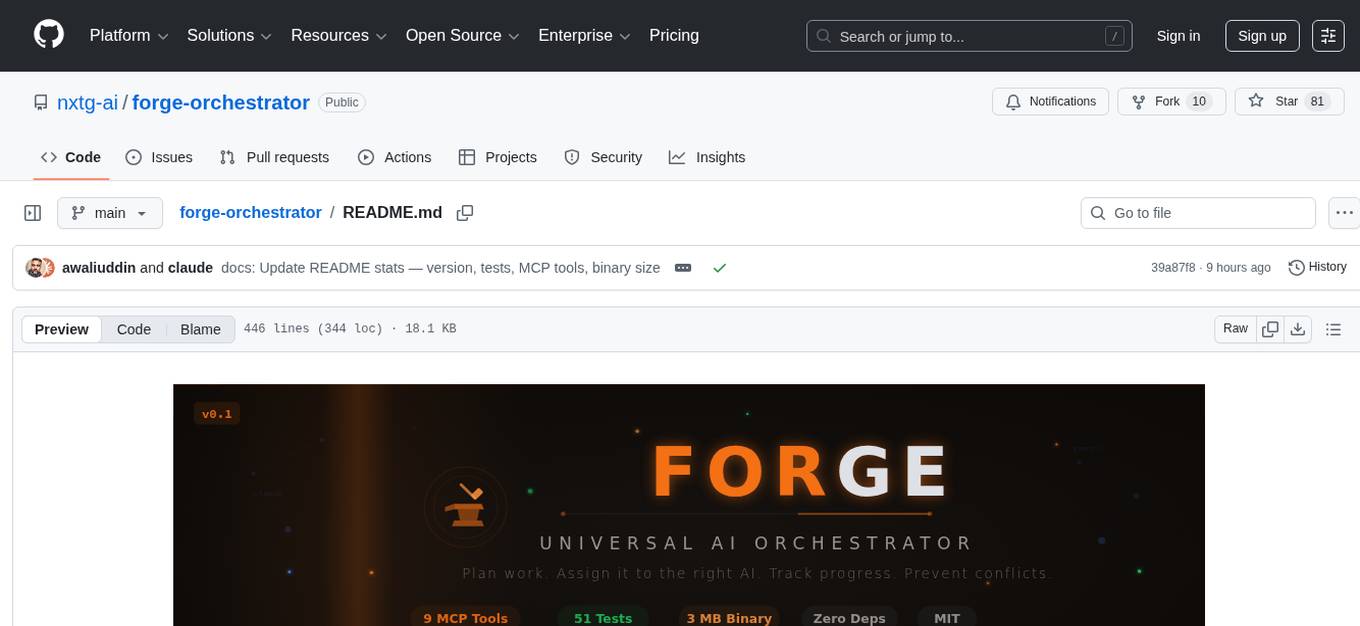
forge-orchestrator
Forge Orchestrator is a Rust CLI tool designed to coordinate and manage multiple AI tools seamlessly. It acts as a senior tech lead, preventing conflicts, capturing knowledge, and ensuring work aligns with specifications. With features like file locking, knowledge capture, and unified state management, Forge enhances collaboration and efficiency among AI tools. The tool offers a pluggable brain for intelligent decision-making and includes a Model Context Protocol server for real-time integration with AI tools. Forge is not a replacement for AI tools but a facilitator for making them work together effectively.
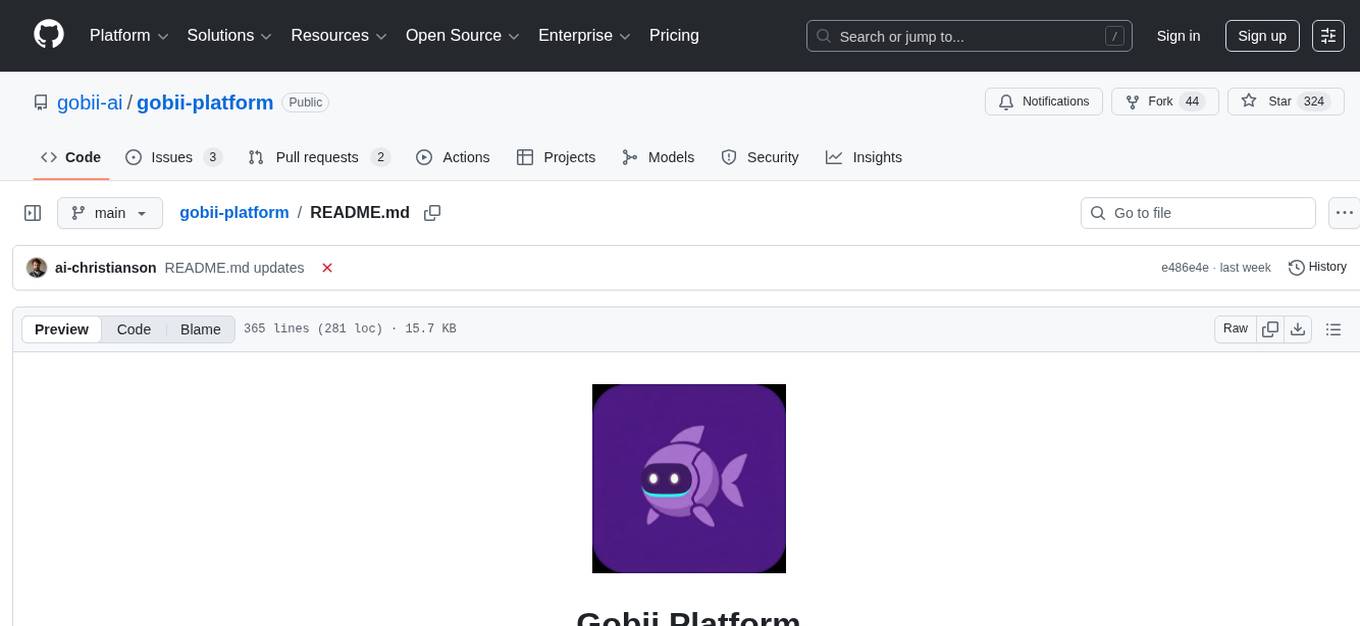
gobii-platform
Gobii Platform is an open-source platform designed for running durable autonomous agents in production. Each agent can run continuously, wake from schedules and events, use real browsers, call external systems, and coordinate with other agents. It is optimized for reliable, secure, always-on agent operations for teams and businesses. Gobii treats agents as operational entities with addressable communication endpoints, allowing teams to contact them directly like AI coworkers. The platform provides security-first controls, encrypted-at-rest secrets, proxy-governed egress, and Kubernetes sandbox compute support. Gobii is purpose-built for secure, governed, always-on production execution in cloud or hybrid environments.







































